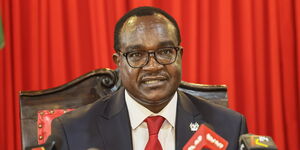National Assembly Speaker Moses Wetangula on Tuesday, June 20, singled out eight clauses within the Finance Bill, 2023, that will be debated before the House.
Wetangula deviated from the normal tradition of debating the bill on a clause-by-clause basis and instead opted to list eight clauses that attracted the highest proposals for amendment. The entire bill consists of 79 clauses.
"In my view and in consultation with the clerks at the table, the clauses that have attracted the highest proposal for amendment are clauses 2, 24, 33, 34, 36, 43, 76, 78.
"I'll allow and this is not a precedence setting. It is a unique situation that I will allow in the interest of fairness and arriving at a consensual bill that takes our country forward. You will be allowed to prosecute your amendment," Wetangula noted.
Here is a breakdown of the Clauses:
Income Tax
The amendment was proposed by Seme MP James Nyikal to amend digital content monetisation. The amendment further offers the use of a logo, brand, and catchphrase associated with content creator merchandise as well as software.
There was another proposal for a content creator to earn a commission from crowdfunding.
The withholding tax from digital content creation was proposed to reduce to five per cent from the initial 15 per cent.
Excise Duty Act
The changes are expected to see the amount wagered set aside in the withholding tax. The initial proposal in the bill included the wagered amount as part of the winnings.
LPG
A change was proposed for the Liquified Petroleum Gas (LPG) to be moved from the exempt category to the zero-rated group. This would allow LPG manufacturers to seek compensation from Kenya Revenue Authority (KRA) for Value Added Tax (VAT) resulting in cheaper gas costs.
Housing Levy
The controversial Housing Fund was lowered from three per cent to 1.5 per cent. With the change, the Fund was transformed into a tax (from a levy) - meaning that the amount will not be refunded after collection.
Lawmakers, however, proposed that the contribution be made voluntary and subject to interest once individuals lay claim to the money after seven years.
PAYE
With the new Pay-As-You-Earn tax bracket, those earning between Ksh500,000 and Ksh800,000 would be subjected to a 32.5 per cent tax. Those earning above Ksh800,000 would incur a 35 per cent rate.
The initial proposal involved a 35 per cent rate for all income-earners garnering over Ksh500,000.
Turnover Tax
The tax now targets businesses whose annual revenue clocked between Ksh1 million and Ksh25 million. Initially, the proposal targeted businesses earning between Ksh500,000 and Ksh15 million.
Petroleum Products
Members of Parliament will also debate the 16 per cent levy on petroleum products. The clause was heavily opposed during the public participation stage with the majority advocating against it.
Basic Commodities
The supply of maize flour and sugar was proposed to remain zero-rated from the exempt category. According to the Azimio la Umoja coalition, the costs of the basic commodities would have risen if the proposed VAT remained in the exempt category.












